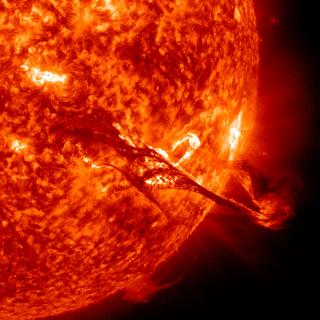Bibcode
Felipe, T.; Braun, D. C.; Birch, A. C.
Referencia bibliográfica
Astronomy and Astrophysics, Volume 604, id.A126, 9 pp.
Fecha de publicación:
8
2017
Revista
Número de citas
12
Número de citas referidas
12
Descripción
Improving methods for determining the subsurface structure of sunspots
from their seismic signature requires a better understanding of the
interaction of waves with magnetic field concentrations. We aim to
quantify the impact of changes in the internal structure of sunspots on
local helioseismic signals. We have numerically simulated the
propagation of a stochastic wave field through sunspot models with
different properties, accounting for changes in the Wilson depression
between 250 and 550 km and in the photospheric umbral magnetic field
between 1500 and 3500 G. The results show that travel-time shifts at
frequencies above approximately 3.50 mHz (depending on the phase-speed
filter) are insensitive to the magnetic field strength. The travel time
of these waves is determined exclusively by the Wilson depression and
sound-speed perturbation. The travel time of waves with lower
frequencies is affected by the direct effect of the magnetic field,
although photospheric field strengths below 1500 G do not leave a
significant trace on the travel-time measurements. These results could
potentially be used to develop simplified travel-time inversion methods.
Proyectos relacionados

Simulación Numérica de Procesos Astrofísicos
La simulación numérica mediante códigos complejos de ordenador es una herramienta fundamental en la investigación física y en la técnica desde hace décadas. El crecimiento vertiginoso de las capacidades informáticas junto con el avance notable de la matemática numérica ha hecho accesible a los centros de investigación de tamaño medio
Daniel Elías
Nóbrega Siverio

Magnestismo Solar y Estelar
Los campos magnéticos son uno de los ingredientes fundamentales en la formación de estrellas y su evolución. En el nacimiento de una estrella, los campos magnéticos llegan a frenar su rotación durante el colapso de la nube molecular, y en el fin de la vida de una estrella, el magnetismo puede ser clave en la forma en la que se pierden las capas
Carlos Cristo
Quintero Noda